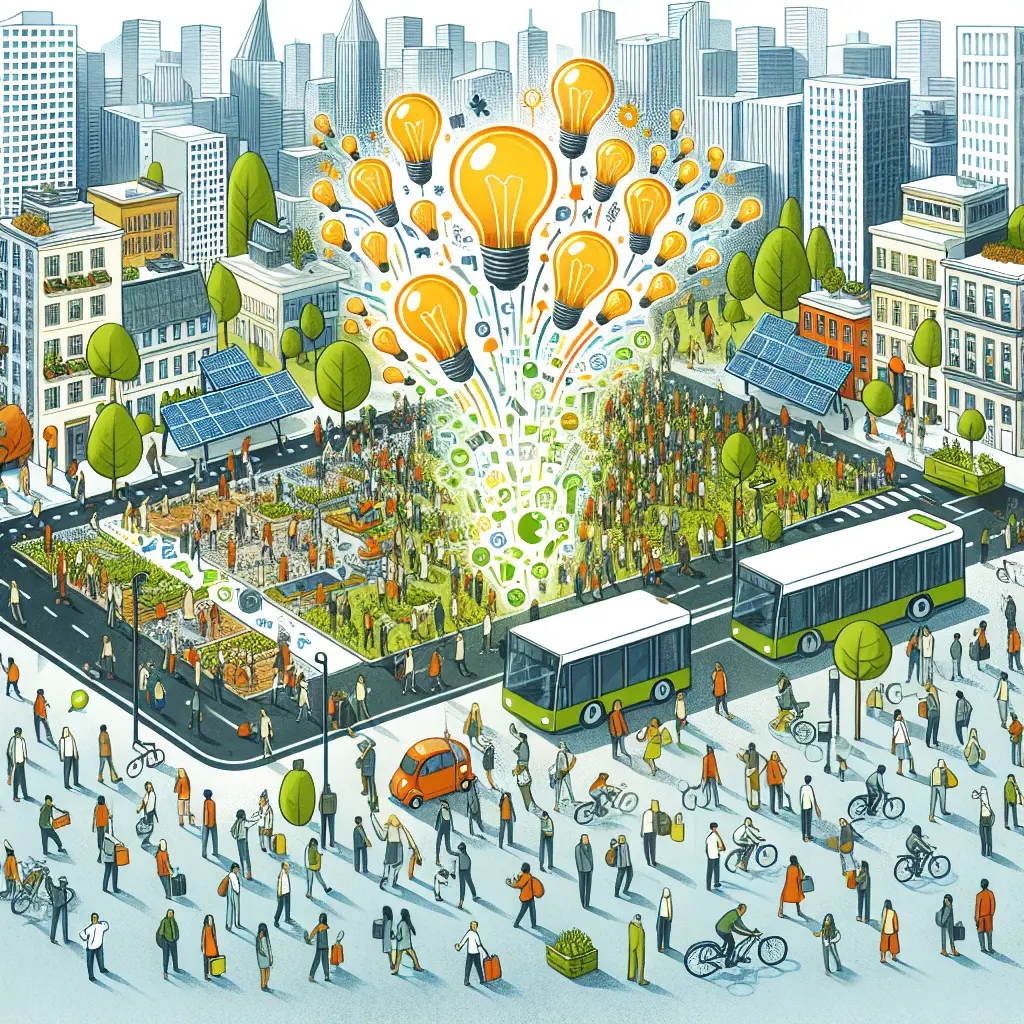
In today's rapidly evolving urban landscapes, the push for sustainable urban development has reached a critical juncture. The traditional top-down approach to city planning is being reshaped by the integration of crowdsourced innovation, allowing citizens to actively participate in the crafting of eco-friendly urban strategies. By leveraging the collective intelligence of communities, cities are transforming into more resilient, inclusive, and sustainable environments.
The Power of Smart City Crowdsourcing
Smart city crowdsourcing taps into the creativity and ideas of citizens, offering a platform for participatory urban development. This process empowers residents to contribute directly to urban innovation by suggesting solutions that meet local needs while aligning with broader sustainability goals. For instance, the success of public participation in urban planning can be observed in various cities worldwide where community-driven projects have improved urban resilience through crowdsourcing.
A recent example is Canada, where the government has turned to its citizens for innovative ideas to combat the rising issue of car theft. By inviting public input, authorities not only seek practical solutions but also foster a sense of ownership and responsibility among residents, which is crucial for long-term urban sustainability (Learn more about Canada's initiative).
Case Studies: Crowdsourced Solutions in Action
The Skift IDEA Awards 2024 highlighted numerous innovative projects that exemplify the potential of crowdsourced innovation in sustainable urban development. One standout project focused on integrating green urban innovation into travel infrastructure, making eco-friendly options more accessible and appealing to travelers (Discover more about Skift IDEA Awards).
Another inspiring initiative comes from Oakland, where the Pioneer League B's have engaged fans directly in sustaining local baseball through community investment. This model not only preserves local culture but also encourages civic engagement and community-led urban development (Explore Oakland's community initiative).
Benefits of Participatory Urban Development
Participatory urban development ensures diverse voices contribute to the conversation on urban growth. This inclusivity leads to collaborative urban solutions that are more reflective of community needs and aspirations. By fostering public participation in urban planning, cities can better anticipate future challenges and adapt accordingly. This is evident in the rise of entrepreneurs as digital nomads who are reshaping urban spaces by creating flexible and adaptive business environments that cater to a mobile workforce (Read about digital nomads' impact).
Moreover, the integration of digital tools like Tencent's immersive digital experiences has enhanced public engagement by providing virtual platforms for residents to explore and contribute to city planning initiatives (Learn about Tencent's digital tools).
Challenges and Strategies for Implementing Crowdsourced Innovation
While the potential benefits of crowdsourced innovation are vast, implementing these strategies presents several challenges. Ensuring effective communication and coordination among diverse stakeholders is paramount. Furthermore, cities must address potential data privacy concerns that arise from increased citizen involvement.
To overcome these challenges, cities can employ strategies such as:
- Establishing Clear Communication Channels: Creating dedicated platforms for idea submission and feedback can facilitate seamless interaction between citizens and city planners.
- Ensuring Data Security: Implementing robust cybersecurity measures can protect citizen data and build trust in crowdsourcing initiatives.
- Providing Incentives: Offering rewards or recognition for valuable contributions can motivate more citizens to participate actively in urban planning processes.
These strategies not only encourage active participation but also ensure the sustainability of crowdsourcing for cities.
Future Trends in Urban Innovation
As we look toward the future, several trends are shaping the landscape of sustainable city planning through crowdsourced innovation:
Integration with Artificial Intelligence (AI): The growing role of AI in analyzing crowdsourced data enables more accurate and efficient urban planning decisions (Explore AI's impact on planning).
Increased Use of Blockchain Technology: Embracing blockchain for transparency in project funding and implementation can enhance trust and accountability among stakeholders.
Expansion of Digital Platforms: The emergence of digital adoption professionals highlights the increasing importance of digital tools in facilitating public participation (Discover digital adoption trends).
By embracing these trends, cities can further enhance their ability to create innovative urban sustainability initiatives that are both effective and inclusive.
Conclusion: Embracing a Collective Vision for Sustainable Cities
In our rapidly changing world, the path to sustainable urban development relies heavily on the power of crowdsourced innovation. By engaging citizens directly in the planning and development of their communities, cities can create resilient, inclusive, and eco-friendly environments. The examples from Canada and Oakland illustrate the transformative potential of public participation, showcasing how local input can address specific challenges while fostering a sense of community ownership.
Participatory urban development ensures that diverse perspectives shape urban growth, making it more reflective of community needs. The integration of digital tools and the application of emerging technologies like AI and blockchain are pivotal in enhancing this collaborative approach, ensuring transparency and efficiency in city planning. However, challenges such as communication barriers and data privacy concerns must be addressed through clear strategies and robust security measures.
The journey towards sustainable cities is a shared endeavor that requires the active involvement of all stakeholders. As we embrace this collaborative approach, the potential for innovative, sustainable urban solutions is immense. I invite you to share your thoughts and experiences on how crowdsourced innovation can further enhance our cities. Together, we can pave the way for a sustainable future that values inclusivity and community engagement.
Let's continue this conversation and work together towards vibrant, livable spaces for all.
Warm regards,
Sarah Caldwell